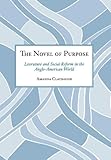The Novel of Purpose : Literature and Social Reform in the Anglo-American World / Amanda Claybaugh.
Material type: TextPublisher: Ithaca, NY : Cornell University Press, [2018]Copyright date: ©2006Description: 1 online resource (264 p.)Content type:
TextPublisher: Ithaca, NY : Cornell University Press, [2018]Copyright date: ©2006Description: 1 online resource (264 p.)Content type: - 9781501727016
- American fiction -- History and criticism -- 19th century
- American fiction -- 19th century -- History and criticism
- English fiction -- History and criticism -- 19th century
- English fiction -- 19th century -- History and criticism
- Social movements in literature
- Social problems in literature
- American Studies
- Literary Studies
- LITERARY CRITICISM / American / General
- 823.009355
- PR778.S62
- online - DeGruyter
| Item type | Current library | Call number | URL | Status | Notes | Barcode | |
|---|---|---|---|---|---|---|---|
 eBook
eBook
|
Biblioteca "Angelicum" Pont. Univ. S.Tommaso d'Aquino Nuvola online | online - DeGruyter (Browse shelf(Opens below)) | Online access | Not for loan (Accesso limitato) | Accesso per gli utenti autorizzati / Access for authorized users | (dgr)9781501727016 |
Frontmatter -- Contents -- Acknowledgments -- Introduction. Cross Purposes -- Chapter 1. Social Reform and the New Transatlanticism -- Chapter 2. The Novel of Purpose and Anglo-American Realism -- Chapter 3. Charles Dickens. A Reforrner Abroad and at Home -- Chapter 4. Anne Bronte and Elizabeth Stoddard. Temperance Pledges, Marriage Vows -- Chapter 5. George Eliot and Henry James. Exemplary Women and Typical Americans -- Chapter 6. Mark Twain. Reformers and Others· Con Artists -- Chapter 7. Thomas Hardy. New Women, Old Purposes -- Epilogue -- Works Cited -- Index
restricted access online access with authorization star
http://purl.org/coar/access_right/c_16ec
In the nineteenth century, Great Britain and the United States shared a single literary marketplace that linked the reform movements, as well as the literatures, of the two nations. The writings of transatlantic reformers—antislavery, temperance, and suffrage activists—gave novelists a new sense of purpose and prompted them to invent new literary forms. The result was a distinctively Anglo-American realism, in which novelists, conceiving of themselves as reformers, sought to act upon their readers—and, through their readers, the world. Indeed, reform became so predominant that many novelists borrowed from reformist writings even though they were skeptical of reform itself. Among them are some of the century's most important authors: Anne Brontë, Charles Dickens, George Eliot, Thomas Hardy, Henry James, Elizabeth Stoddard, and Mark Twain. The Novel of Purpose proposes a new way of understanding social reform in Great Britain and the United States. Amanda Claybaugh offers readings that connect reformist agitation to the formal features of literary works and argues for a method of transatlantic study that attends not only to nations, but also to the many groups that collaborate across national boundaries.
Mode of access: Internet via World Wide Web.
In English.
Description based on online resource; title from PDF title page (publisher's Web site, viewed 26. Apr 2024)


